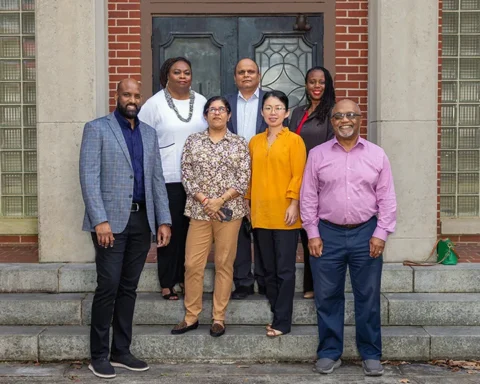Courtesy of North Carolina A&T State University
A researcher at North Carolina Agricultural and Technical State University has received a four-year, $2.65 million grant to advance his work in functional foods and human health.
The grant was awarded to Shengmin Sang, Ph.D., for a project aimed at studying the biomarkers of dietary flavonoids and targeting carbonyl stress to help prevent type 2 diabetes. The grant came from the National Institute of Diabetes and Digestive and Kidney Diseases, part of the National Institutes of Health.
Sang is the Distinguished Professor of Functional Foods and Human Health with A&T’s College of Agriculture and Environmental Sciences. His laboratory is located at the Center for Excellence in Post-Harvest Technologies at the North Carolina Research Campus in Kannapolis. He will work on his newest project with three collaborators from Harvard University.
“The main goal of this study is to provide scientific evidence that eating flavonoid-rich food can prevent the development of metabolic diseases,” Sang said. “We all believe that fruits and vegetables are healthy foods. In terms of why, we don’t know. We want to know if these healthy foods can lower the levels of toxic reactive carbonyl species in our bodies.”
Sang has devoted the bulk of his career to researching the connection between functional foods — foods that provide more than just basic energy and nutrition — and human health. Sang has largely focused on flavonoids, which are compounds commonly found in fruits and vegetables as well as food and drinks made from plants. Flavonoids have anti-oxidant properties that are believed to fend off toxins, inflammation and chronic ailments such as cardiovascular and kidney disease and diabetes. But prior studies haven’t been able to show a clear link between flavonoids and chronic disease prevention in humans because scientists couldn’t accurately measure the intake of dietary flavonoids.
For this study, Sang and his team will collect samples from human volunteers who consume green tea, soy milk and blueberries — food rich in flavonoids — and use metabolomic approaches to study the biomarkers of the top 15 dietary flavonoids. They also will try to determine if flavonoids can reduce carbonyl stress caused by elevated levels of reactive carbonyl compounds in the body that can lead to a variety of chronic illnesses. The epidemiological portion of the study will examine the relationship between these biomarkers and the risk of type 2 diabetes.
Sang received a Research Project Grant, or R01, the NIH’s oldest and most competitive grant program for biomedical and health-related research. The award is Sang’s fourth NIH R01 grant. He previously was awarded R01 funding for projects involving black tea, whole grains and ginger extracts.
“This latest award is a testament to the vital work that Dr. Sang is doing to improve human health,” said CAES Dean Mohamed Ahmedna, Ph.D. “Dr. Sang’s latest endeavor will help answer key questions about how exactly the foods we eat can prevent a variety of chronic diseases. This is important research, and N.C. A&T is appreciative for financial support from NIH.”





